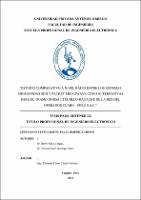Estudio comparativo a nivel radio entre los sistemasmicoondas sdh y packet microwawe como alternativas para el tramo dorsal Trujillo- ragache de la red del operador claro - Perú S.A.C.

Ver/
Descargar
(application/pdf: 1.800Mb)
(application/pdf: 1.800Mb)
Fecha
2016Autor(es)
Silva Vargas, Berly
Noriega Pretel, Yordan Evert
Metadatos
Mostrar el registro completo del ítemResumen
El presente trabajo de investigación documenta, en primer lugar, el estudio de la
problemática de la red de transporte que presenta el enlace principal Trujillo-Ragache
del Operador Claro-Perú S.A.C. se parte delimitando y formulando el problema, se
proponen objetivos y se formula la hipótesis al problema planteado.
En segundo lugar se desarrollaron las bases teóricas, teniendo como referencia lo
estipulado en la primera parte del trabajo, que sirvieron de guía para sostener la
estructura y el desarrollo del trabajo de investigación.
Luego de estudiar las respectivas bases teóricas, se plantearon diversas variables de
estudio, desde el punto de vista estructural y técnico, para comparar los parámetros de
performance a nivel de radio entre las tecnologías planteadas en el enlace TrujilloRagache.
Luego se detallan las técnicas utilizadas para analizar mediante la simulación
los parámetros de: Nivel de Recepción, Margen de Desvanecimiento, Disponibilidad,
Indisponibilidad, Capacidad y BER en el enlace dorsal Trujillo-Ragache.
Se muestran los resultados obtenidos de los parámetros mencionados con las diferentes
tecnologías y son comparados. También se discuten para poder explicar que
tecnología es la más adecuada para poder ser implementada en la red de transporte
Trujillo-Ragache del operador Claro-Perú S.A.C.
Finalmente se presentan las conclusiones del trabajo y se proponen recomendaciones
necesarias. “The present investigation work documents, in first place, the study of the transportation
network problem that is present in the main link of the network operator Claro-Perú
S.A.C., it starts by delimiting and stablishing the problem, proposing objectives and
formulating the hypothesis to the given problem.
Secondly the theoretical fundaments are developed, taking as reference the results stated
in the first part of the work, which served as a guide to support the structure and
development of the research.
After studying the respective theoretical fundaments, various study variables were
raised from structurally and technically point of view, to compare the parameters of
efficiency or performance in radio level between the posed technologies used in the link
Trujillo-Ragache. Then the techniques used to analyze are detailed to analyze by
simulating the parameters of: Level Reception, Fade Margin, Availability,
Unavailability, Capacity and BER on the mainstream link Trujillo-Ragache.
The obtained results of the listed parameters with different technologies are show and
compared. Also discussed, to explain wich technology is the most suitable to be
implemented in the transportation network Trujillo-Ragache of the operator Claro-Peru
S.A.C.
Finally conclusions are presented and necessary recommendations are proposed.“
Palabras clave
Colecciones
- Ingeniería Electrónica [147]

